By Mark Ellis —
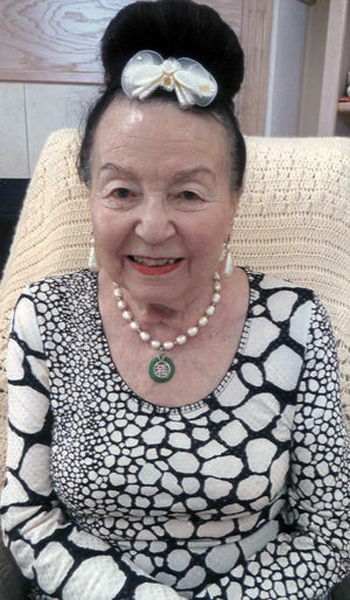
In the closing days of WWII, a British soldier found her almost lifeless body collapsed amid a pile of corpses at Bergen-Belsen. Thousands died from forced starvation and disease before the liberation of this notorious Nazi concentration camp—but one young Jewish woman found God’s strength to survive.
“God had a purpose to save me to tell my story,” says Magda Herzberger, 90, a poet, lecturer, composer and author of four books. Herzberger survived three Nazi death camps during her nightmarish ordeal. For the past 41 years, she’s lectured at schools, universities, churches and through various media appearances.
She was only in fourth grade when “bad things” started happening in her native city of Cluj, Romania. The Romanian government was seduced by the ascendant Nazi and Fascist movements, and anti-Semitic laws began to be enacted. The number of Jews who could attend public schools was drastically limited. On the first day of class, the Jewish students were told to stand and identify themselves as Jews. “We were humiliated in class,” Herzberger recalls.
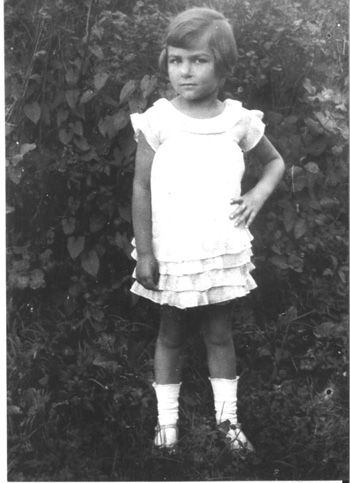
By 1940, no marriages were allowed between Jews and Romanians. Jewish teachers and college professors lost their jobs, as well as Jewish public employees and those in important managerial positions. As a result, her father lost his job and they were forced to move to a small apartment.
“The Jews had to turn in their gold and silver jewelry and their radios,” Herzberger recalls. “There were curfews for Jews and we could only shop at certain hours.”
German troops entered Herzberger’s city in March 1944. After that, all Jews were ordered to wear the Star of David on their clothing. A month later, her family was forced to leave their apartment and move to a designated ghetto on the outskirts of town. “We slept on the ground outside an old brick factory,” she says. “There was no running water.”
By the end of May, Herzberger and her family were loaded on cattle cars headed for Auschwitz. “For three days and three nights they locked us in the cars without food or bathroom facilities. You can imagine the conditions–we had small children and elderly people.”
“When the doors opened the nightmare started,” she says. German soldiers herded the new arrivals off the cars with rubber batons, beating those who didn’t move quickly enough. Then they were placed on a platform, where a crude selection process began headed up by Dr. Josef Mengele, the notorious military officer and doctor who performed sadistic medical experiments on prisoners. Camp inmates nicknamed him “The Angel of Death.”
Children under 14, older people, pregnant women, invalids and the mentally disturbed were directed by Dr. Mengele to the left. “They didn’t know where they were going,” Herzberger says. “To the left meant death.”
Those selected for death were directed on a five-minute walk to one of four huge gas chamber/crematorium complexes at the edge of the camp. Two had an underground dressing room and underground gas chamber capable of holding 3,000 people. In order to avoid panic, victims were told they would be showering.
To complete the masquerade, shower heads were installed in the ceilings. Victims were ordered to strip naked
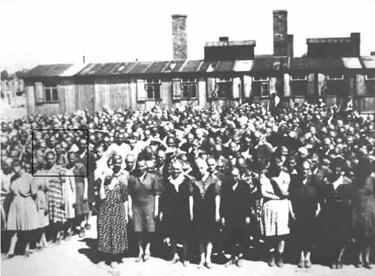
and leave their belongings behind where they could find them. Once sealed in the chamber, Zyklon B—a pesticide used to kill lice—was discharged through a system of underground pipes.
“Everything they had was taken away from them,” Herzberger notes. “Their hair was shaved, their gold teeth extracted. Their ashes were used for fertilizer in the fields and gardens,” she says. Gigantic piles of shoes and clothing and children’s toys were shipped back to German cities for use by the general population.
Several estimates, based on deportation records and train schedules, conclude that 1.1 to 1.6 million perished at Auschwitz. “Auschwitz was an extermination camp,” Herzberger says. “Some were killed by gas, others were killed by the work, by the starvation diet or illnesses that broke out.” Almost daily there were suicides as people intentionally ran into the electrified fence surrounding the camp, rather than continue to face the ongoing humiliations and hardships.
The barracks where 17-year-old Herzberger tried to sleep held 500 women, but there were not enough bunks for all. “We slept close together like sardines on the bare ground,” Herzberger says. As she tried to sleep, she became aware of a terrible smell. “At first we didn’t know what it was,” she says. “The air was filled with the sickening odor of burning flesh belching from the chimneys of the crematorium.”
At one of the weekly roll calls, she remembers one German officer asking: “How many pieces of excrement are here?”
“We were treated like we had no souls; we were numbered, not human beings,” she says. “This cruelty I thought could never exist. We were helpless in their power.” Despite the incredible hardships Herzberger faced, she recounts many answers to prayer and small miracles she attributes to God.
Herzberger determined to fight for survival. “Why did I choose life?” she asks. “God gave me the strength. I didn’t want to be buried there. I wanted to see my parents again.”
Transfer to Bremen
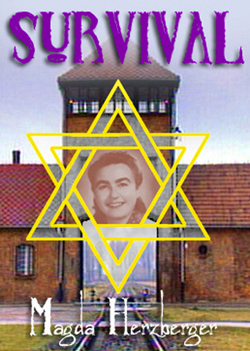
After seven weeks, Herzberger was transferred to a second work camp outside the city of Bremen. She was among 500 young women selected as slave labor to clear the streets of rubble and retrieve bodies from the ongoing aerial bombardments. “It was very hard labor and we had poor nutrition,” she says. They gave Herzberger a pair of wooden Dutch shoes to work in, but no socks or gloves during the winter of 1944-45. Her only protection from the cold was the same flimsy, secondhand dress she received when she first arrived at Auschwitz. None of the women had underwear during their captivity.
“We were happy when we found rags, which we used to wrap around our fingers and feet for warmth,” she recalls.
But the harsh working conditions, frigid temperatures, and lack of nutrition eventually took its toll on Herzberger and her comrades, who were growing increasing sick and weak. By the end of the winter of 1945 the Germans decided to move the Jewish laborers because Allied Forces were closing in on Bremen. In their weakened condition, they were forced to endure a three-day trek on foot.
“Whoever couldn’t march anymore was shot. That was the rule of the SS and they let us know.”
Last stop
Herzberger’s final camp was the notorious Bergen Belsen—a living hell-on-earth. “The camp was littered with corpses in all stages of decay,” she recalls. “The barracks were filled with rats, lice and dead bodies. The prisoners were so weak in the barracks from starvation they couldn’t carry out their dead,” she says. “The prisoners looked like walking skeletons.” The deadly scourge of typhus was raging throughout the camp barracks, spread by lice. Dysentery and tuberculosis were also rampant. Herzberger decided to sleep outdoors
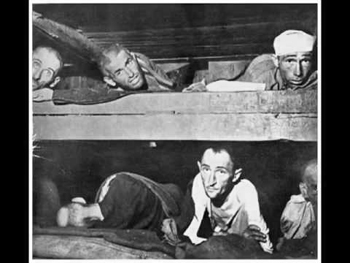
on the ground, even if it meant sleeping next to rotting corpses.
There was no running water or electricity in the camp. In the first week she received one bowl of soup each day, but no bread. Prisoners were expected to work digging ditches, hauling corpses, and burying the dead.
By the end of her second week, the soup was discontinued. “They discontinued our food and drink, but we still had to work dragging corpses,” she says.
New prisoners were arriving daily. “Bergen Belsen was the death terminal for thousands of prisoners, men and women who were taken there from other German concentration camps when the Allied Forces came close,” she notes in her book. “They wanted us dead, not liberated by the Allies. They made every effort to kill as many of us as they could.” The death rate during Herzberger’s captivity at Bergen Belsen was 600 per day.
Herzberger prepared herself emotionally to meet death, as her body began to resemble the dead and dying around her. At the end of her third week at Bergen Belsen she found it increasingly difficult to walk. She dragged herself next to a birch tree and collapsed. There were piles of corpses all around her, and she grasped the trunk of the tree one last time as she noticed some buds of new life in the upper branches. It was a beautiful spring day.
She couldn’t feel hunger or thirst anymore and she closed her eyes, prepared to meet death. Her mind was still active, however. “I felt deep sadness, despair, and anger,” she writes in her book. “I wondered: Why were we condemned to starvation and death? Only because we were Jewish?”
At just 19-years-old, she still had the will to live. “I realized the three most important things we should cherish are our life, our freedom, and our family, and so many times we take them for granted.”
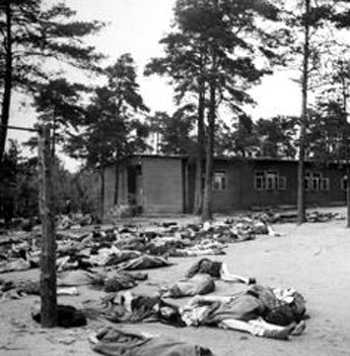
Suddenly, Herzberger heard a big commotion in the camp and cries of joy. She thought perhaps she was dead, but she opened her eyes to see the guards in the watchtowers had disappeared, the gates of the camp were opened, and British troops from the 11th Armored Division had rolled into camp with their tanks. They discovered a “horror camp,” with 30,000 corpses lying on top of the ground in various stages of decomposition.
Miraculously, a British soldier found Herzberger among the thousands of bodies, picked her up in his arms and carried her to safety. Filled with compassion, he cried as he walked, his tears spilling onto her hollowed eye sockets and skeletal-cheeks. Ht took her to a clean barrack, recently deserted by the German guards as they fled.
“I was lying helplessly among the corpses, and I couldn’t speak or move,” she recalls. “How fortunate this soldier
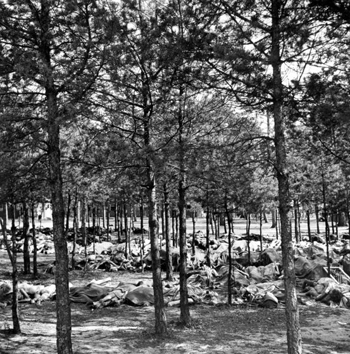
came to this pile of corpses,” she says. “Don’t you think it was God’s will to save me?”
Sadly, thousands more died after their liberation by British troops, either from typhus or irreversible damage to their digestive systems due to starvation. A month later, British troops used flamethrowers to set fire to the barracks, they were so riddled with typhus, louse infestation, filth, and excrement on the floors.
“It took me three months to look like a human being,” Herzberger recalls. Even though she had not recovered completely herself, Herzberger volunteered to work in a typhus hospital as soon as she regained some of her strength. Her friends advised her against it.
“God was with me until now and helped me to survive,” she told her friends. “He will not desert me.”
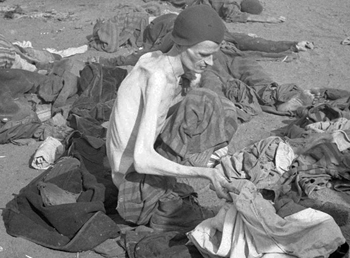
Herzberger lost 80 percent of her family in the holocaust, but in her book she tells the moving story of finding her mother—who survived against all odds. Their family home was completely looted, however, and they never lived there again.
“God had a purpose to save me to tell my story,” she says now. “People have to know about the holocaust,” she says.
Today, Herzberger speaks to Jewish as well as Christian groups. “We’re not that far apart—we’re from the same family,” she notes. “Jesus was a Jewish rabbi,” she says. “I’m not one to reject Jesus…maybe he was the Messiah.”
“I love God with all my heart and I believe in the power of prayer.”
Editor’s note: Herzberger died in April 2021 at the age of 95
If you would like to know God personally, go here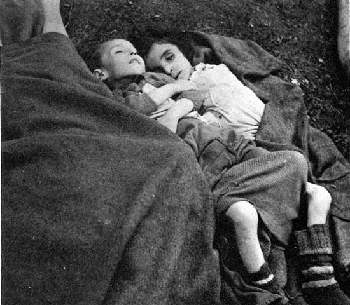




You are fulfilling a mighty purpose for God. Don’t quit until you’re done. The world needs you. What a blessing! What a story! I want to know you when we all get HOME!
God always save the life of some people to let the world know how evil man can be under the power of demonic forces.Those who reject Jesus as the messiah has suffer a lot of atrocity Jesus gave enough evidence that he is the Messiah but when we chose to reject him we reject life itself and his protection over us.May we learn from these experience and accept what God say even if we don’t understand it because God say it we need to respect it and accept it the day will come when God will reveal all things to us….
It is very hard to imagine what those terrorized souls had to endure because of hatred. If this was to happen today in much the same way as it did then and now I was the one suffering I asked myself would I go down without a fight or would I fight to the death? What would happen if those targeted would fight back? The advantage we have today is history has already shown us the results of human beings who become barbarians and act like rabid monsters. To me it’s time to be ready to defend ourselves because that murderous spirit is gaining strength in this whole world including the USA and needs to be defeated. Good thing there were soldiers then who fought for those terrorized people and took back decency. Salute! We need to be on the alert and be the good soldiers we need to be and be ready to fight back. It’s the right thing to do in my mind.
Please find Jesus. He’s the Messiah you have waited for. Don’t reject Him any longer. He will bring llighting your life.
Thank you for this powerful report. May we never forget. My great-uncle survived Siberia in that time. He didn’t talk about it, but we know he lost his mother and baby sibling off one of the “cattle” cars en route up north. They survived sleeping under pine boughs and eating berries and bark. What a precious account of that Allied soldier rescuing Magda. I pray that soldiers, angels, will help all those persecuted around the world today: Syrian Christians and so many others. May God help us.
Praise God for one more Jewish person who lived to share their story. I can not believe people still deny the horrors of what the Jewish people endured. God Bless them for their enduring strength.
Praise the Lord for saving her
It is Jesus alone who saved her
To let her know Him and to be eternally saved
Dearest Magda, praise God He was with you while you lived through such a horrifying time of war in the concentration camps. My heart hurts and breaks for you and countless others who survived, and or lost loved ones. I’m so very sorry this happened to you and millions others. I just finished reading the nightingale and feel so downcast and sorrowful. You have done very well for yourself since the war ended. I do pray you accept Jesus as your Messiah. I came to know him in my early 30’s. I’ll be 58 this summer. He has been my hope, companion, trusted friend and counselor all these years through good times and bad times. If you read the 4 gospels, you’ll see Him as your Messiah fulfilling all the prophecy’s spoken of by your prophets. He loves you and waits for you…
on another note, I live in So. California and long to be of service to any survivors in my area or a trusted group/organization who helps survivors. Please, if you know of or can help me find a place to serve, I would be grateful.
Comments are closed.